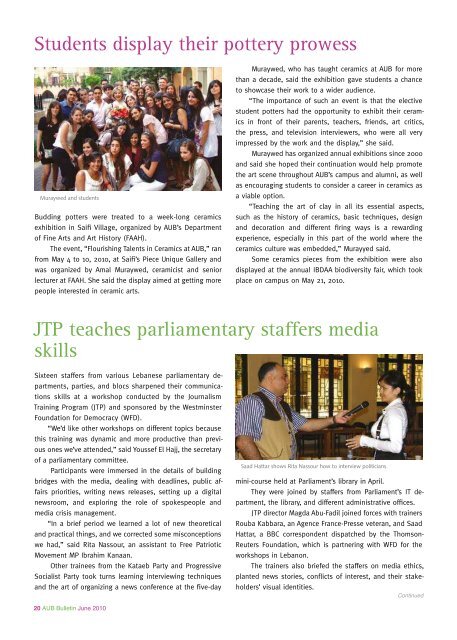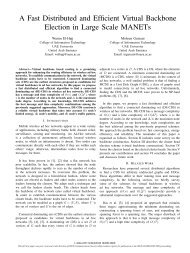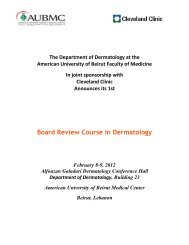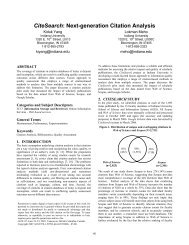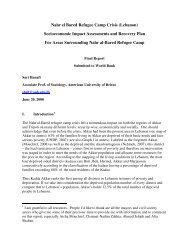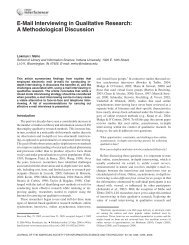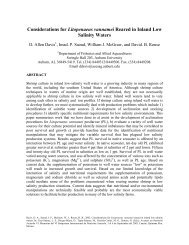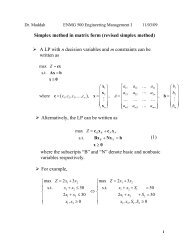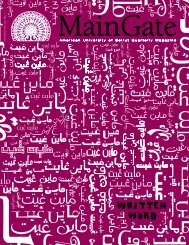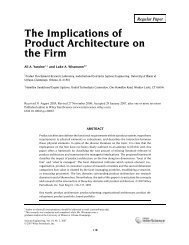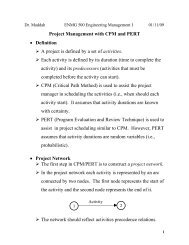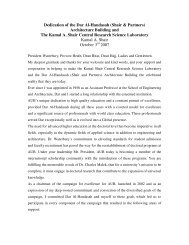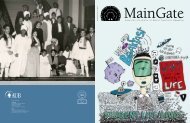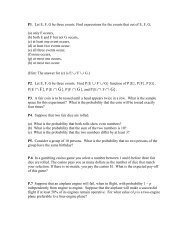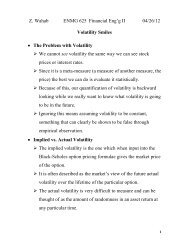Bulletin - American University of Beirut
Bulletin - American University of Beirut
Bulletin - American University of Beirut
Create successful ePaper yourself
Turn your PDF publications into a flip-book with our unique Google optimized e-Paper software.
Students display their pottery prowess<br />
Muraywed and students<br />
Budding potters were treated to a week-long ceramics<br />
exhibition in Saifi Village, organized by AUB’s Department<br />
<strong>of</strong> Fine Arts and Art History (FAAH).<br />
The event, “Flourishing Talents in Ceramics at AUB,” ran<br />
from May 4 to 10, 2010, at Saifi’s Piece Unique Gallery and<br />
was organized by Amal Muraywed, ceramicist and senior<br />
lecturer at FAAH. She said the display aimed at getting more<br />
people interested in ceramic arts.<br />
Muraywed, who has taught ceramics at AUB for more<br />
than a decade, said the exhibition gave students a chance<br />
to showcase their work to a wider audience.<br />
“The importance <strong>of</strong> such an event is that the elective<br />
student potters had the opportunity to exhibit their ceramics<br />
in front <strong>of</strong> their parents, teachers, friends, art critics,<br />
the press, and television interviewers, who were all very<br />
impressed by the work and the display,” she said.<br />
Muraywed has organized annual exhibitions since 2000<br />
and said she hoped their continuation would help promote<br />
the art scene throughout AUB’s campus and alumni, as well<br />
as encouraging students to consider a career in ceramics as<br />
a viable option.<br />
“Teaching the art <strong>of</strong> clay in all its essential aspects,<br />
such as the history <strong>of</strong> ceramics, basic techniques, design<br />
and decoration and different firing ways is a rewarding<br />
experience, especially in this part <strong>of</strong> the world where the<br />
ceramics culture was embedded,” Murayyed said.<br />
Some ceramics pieces from the exhibition were also<br />
displayed at the annual IBDAA biodiversity fair, which took<br />
place on campus on May 21, 2010.<br />
JTP teaches parliamentary staffers media<br />
skills<br />
Sixteen staffers from various Lebanese parliamentary departments,<br />
parties, and blocs sharpened their communications<br />
skills at a workshop conducted by the Journalism<br />
Training Program (JTP) and sponsored by the Westminster<br />
Foundation for Democracy (WFD).<br />
“We’d like other workshops on different topics because<br />
this training was dynamic and more productive than previous<br />
ones we’ve attended,” said Youssef El Hajj, the secretary<br />
<strong>of</strong> a parliamentary committee.<br />
Participants were immersed in the details <strong>of</strong> building<br />
bridges with the media, dealing with deadlines, public affairs<br />
priorities, writing news releases, setting up a digital<br />
newsroom, and exploring the role <strong>of</strong> spokespeople and<br />
media crisis management.<br />
“In a brief period we learned a lot <strong>of</strong> new theoretical<br />
and practical things, and we corrected some misconceptions<br />
we had,” said Rita Nassour, an assistant to Free Patriotic<br />
Movement MP Ibrahim Kanaan.<br />
Other trainees from the Kataeb Party and Progressive<br />
Socialist Party took turns learning interviewing techniques<br />
and the art <strong>of</strong> organizing a news conference at the five-day<br />
Saad Hattar shows Rita Nassour how to interview politicians.<br />
mini-course held at Parliament’s library in April.<br />
They were joined by staffers from Parliament’s IT department,<br />
the library, and different administrative <strong>of</strong>fices.<br />
JTP director Magda Abu-Fadil joined forces with trainers<br />
Rouba Kabbara, an Agence France-Presse veteran, and Saad<br />
Hattar, a BBC correspondent dispatched by the Thomson-<br />
Reuters Foundation, which is partnering with WFD for the<br />
workshops in Lebanon.<br />
The trainers also briefed the staffers on media ethics,<br />
planted news stories, conflicts <strong>of</strong> interest, and their stakeholders’<br />
visual identities.<br />
Continued<br />
The trainees staged mock news conferences, and Hattar<br />
demonstrated the pitfalls <strong>of</strong> journalists’ tough questions<br />
and ambush interviews.<br />
“It was particularly beneficial to me as I am now more<br />
insistent on transparency and accuracy in the dissemination<br />
JTP promotes media cultural diversity at Rio<br />
UN Alliance <strong>of</strong> Civilizations<br />
Magda Abu-Fadil (far left) attending forum.<br />
The media need coaching in cultural diversity to develop<br />
sensitivity to differences in race, religion, and ethnic<br />
backgrounds, Journalism Training Program Director Magda<br />
Abu-Fadil told participants at the United Nations Alliance<br />
<strong>of</strong> Civilizations Forum in Rio de Janeiro.<br />
“We start with simple and easy to remember rules: accuracy,<br />
fairness, balance, and never making assumptions<br />
about people or things,” she said at a roundtable to launch<br />
UNESCO’s World Report, “Investing in Cultural Diversity<br />
and Intercultural Dialogue” (http://portal.unesco.org/culture/en/ev.php-URL_ID=35396&URL_DO=DO_TOPIC&URL_<br />
SECTION=201.html), to which she was a contributor.<br />
Abu-Fadil’s recommendations for promoting media<br />
literacy programs were included in a chapter on communication<br />
and cultural contents. UNESCO promoted the world<br />
report at the May forum.<br />
The journalistic rules to which Abu-Fadil referred depend<br />
on a basic element the media <strong>of</strong>ten overlook—critical<br />
thinking—which enables humans to discern, respect, and<br />
accept cultural differences.<br />
<strong>of</strong> news,” said Houtaf Dham, a reporter for Al Bina’ newspaper<br />
and a member <strong>of</strong> the Syrian Socialist Party, adding<br />
that she hoped the workshop would be held again for other<br />
staffers.<br />
It begins at home, where children pick up cues from<br />
their parents’ behavior towards others; it is reinforced<br />
at school, where some <strong>of</strong> those behavioral patterns are<br />
manifested; and, increasingly, it has been influenced by the<br />
media that play an all too pervasive role in people’s lives.<br />
“Journalists must have the ability to ask questions and<br />
understand answers in a second language. It’s imperative<br />
that self-respecting journalists be fluent in two or more languages,”<br />
Abu-Fadil said, adding that unless journalists learn<br />
to decipher other people’s languages, cultures, backgrounds,<br />
and problems, they could be misled, or misleading.<br />
UNESCO Director General Irina Bokova invited Abu-<br />
Fadil to be a keynote speaker at the event that grouped<br />
Bokova, André Azoulay, president <strong>of</strong> the Ana Lindh Euro-<br />
Mediterranean Foundation for the Dialogue Between Cultures,<br />
<strong>University</strong> <strong>of</strong> Chicago Pr<strong>of</strong>essor Manuela Carneiro de Cunha,<br />
Benin’s envoy to UNESCO Olabiyi Balalola Joesph Yai, and<br />
Pr<strong>of</strong>. Homi Bhabha, head <strong>of</strong> Harvard <strong>University</strong>’s Humanist<br />
Center.<br />
The roundtable was one <strong>of</strong> several activities during<br />
the Alliance <strong>of</strong> Civilizations Forum featuring Brazilian<br />
President Luiz Inácio Lula da Silva, UN Secretary General<br />
Ban Ki-Moon, Turkish Prime Minister Recep Tayyip Erdogan,<br />
former Portuguese President Jorge Sampaio, UNESCO<br />
Special Envoy for Basic and Higher Education and Qatari<br />
First Lady, Sheikh Mozah bint Nasser Al Missned, Arab<br />
League Secretary General Amr Moussa, Saudi Foreign<br />
Minister Saud Al Faisal, Argentinian President Cristina<br />
Fernandez de Kirshner and Bolivian President Evo Morales.<br />
Spring Poetry Festival blames materialism for<br />
poetry’s predicament<br />
Poetry today is in a state <strong>of</strong> crisis, as the quest for material<br />
gain has overshadowed appreciation <strong>of</strong> nature, said Tarek<br />
Nasereddine, vice president <strong>of</strong> the Lebanese Writers’ Union,<br />
during a poetry festival held on campus on May 17, 2010.<br />
“What is needed today is not just a campaign for<br />
cleanliness. . . but also a campaign to cleanse our souls<br />
and become more attuned to our surroundings,” said<br />
Nasereddine.<br />
The Lebanese Heritage Club at AUB organized the<br />
poetry festival in collaboration with the Lebanese Writers<br />
Union, which honored six AUB students who had won the<br />
Literary Competition initiated by the union. The themes <strong>of</strong><br />
Continued<br />
20 AUB <strong>Bulletin</strong> June 2010 AUB <strong>Bulletin</strong> June 2010 21


